Unveiling luxury hotel branding: Definitions, strategies and expert insights
When you picture a luxurious hotel like the Oberoi, Belmond, Park Hyatt or Rosewood Hotels & Resorts, what images come to mind?
You might appreciate their grandeur, sophistication or unique guest experience. Or perhaps you value the cosy beds, exceptional amenities, or delicious cuisine. But have you ever considered their branding strategy?
In today’s highly competitive and ever expanding hospitality industry, hotel brands play an increasingly vital role.
With over 10,000 hotels in this country alone, it can be challenging for luxury hotels to stand out and capture customers’ attention, especially during economic downturns.
Ultimately, a strong brand identity empowers any brand to differentiate itself in a crowded and saturated market. For luxury hotels, a cohesive brand identity is crucial for effectively communicating their unique value proposition and exemplary service commitment.
So, what does it take to build a successful luxury brand for a luxury hotel? It begins with understanding the significance of branding and how it can foster customer loyalty, enhance visibility and ultimately drive revenue growth.
Whether you’re an experienced hotelier considering a rebrand or a boutique hotel aspiring to make a mark in the world of luxury hospitality, this article will provide you with the knowledge and insights to create effective branding for your business.
What is luxury hotel branding? A definition.
Luxury branding is all about creating a unique identity for high-end hotels that captures exclusivity, sophistication and top-notch service.
It’s not just about appealing decorations or amenities but about crafting an experience that stands out to guests who expect the best. Ultimately, luxury branding curates a lifestyle that appeals to those desiring the premier hospitality experience.
This involves paying close attention to every detail, from your atmosphere and interior design to how well-trained your staff are and the personalised services they provide.
Key elements include:
1. Hotel brand identity. This is the physical embodiment of your brand, and it encompasses your hotel’s name, logo, colour scheme, and typography, but also the intangible elements like your mission statement, messaging, and guidelines. As a luxury hotel, your visual elements should communicate luxury, elegance, and meticulous attention to detail – as should the experiences that you provide.
2. Brand values and personality. Luxury hotels often emphasise values such as impeccable service, a focus on wellness, attention to detail, exclusivity, luxurious experiences, or a commitment to excellence. Your brand personality should reflect these values and resonate with your target audience, communicating exactly why you’re the best luxury hotel and why potential guests should choose you over your competitors.
3. Unique selling proposition (USP). You must identify what sets you apart from other hotel chains and emphasise this in your branding. This could include your amenities, location, chefs, design, sustainability efforts or exclusive experiences. Whatever your key differentiators are, this is your chance to shout about them and let prospective customers know.
4. Service excellence. Exceptional service is a hallmark of luxury hotels. Your branding efforts should emphasise your hotel’s commitment to providing personalised, anticipatory, and seamless service to guests. This is what separates world-class hoteliers from standard ones, so make sure that you’ve curated and honed the finest services you can.
5. Brand experience. Every interaction, from online reservations to check-in, accommodations, dining and amenities, should embody the essence of luxury. Consistency across touchpoints ensures that your guests experience an unforgettable experience that reflects your commitment to unparalleled hospitality.
Luxury hotel branding: Why is it so important?
The real question is, why wouldn’t it be?
Effective branding for hotels, regardless of status, entices existing customers to return and convinces new ones to trust you. It’s the difference between acceptance or rejection, it’s the key to repeat business and crucially, it can drive market growth and expansion opportunities.
Ultimately, successful branding establishes a strong emotional connection with guests, fostering long-term relationships and enhancing the overall reputation of your hotel.
It serves as a foundation for building a recognisable and trusted brand identity, which in turn provides a competitive edge and drives success by attracting discerning clientele and commanding premium rates.
How to build a luxury hotel brand: The essentials
Creating a successful hotel brand is never easy, but with the right brand strategy, tools and knowledge, you can pave the path to success.
Here are the essential components of a five-star brand strategy.
Assess your brand position
Before sculpting your brand identity, you must undertake a comprehensive assessment of your current brand positioning.
Consider the key factors that set your hotel apart from competitors. What distinguishes your customer service? Why should customers choose you? Identify your strengths, weaknesses and threats. Consider what your loyal customers cherish about you and what they would appreciate more of. This analysis will form the bedrock of your brand strategy, so leave no stone unturned.
In the ever-evolving hospitality landscape, it’s vital that you keep your finger on the pulse and stay on top of always-changing market trends. Scrutinise consumer preferences, emerging technologies and shifts in the world of luxury travel to stay ahead of the curve.
Define your brand promise
Every great hotel promises something to its guests. Yes, delicious food and excellent rooms matter, but it’s your unique promise that will keep customers coming back time and time again. Whether it’s the spirit of adventure or the luxury of privacy, your brand promise should underpin all your branding efforts and guest experiences.
During the early stages of your brand design journey, centre your focus on crafting your brand mission statement, defining your ethos and clarifying your values. Understanding the emotions you want to evoke in your guests will steer you through the next steps.
Establish brand tone & identity
Next, it’s crucial to ensure that your tone and identity align with the preferences of your customer base and distinguish you from your competitors.
Begin by developing a distinct brand personality showcasing your unique selling points. Whether offering wellness packages or modern interiors, carefully consider what sets you apart positively.
If your brand were a person, how would it speak? Customers expect luxury brands to be refined, intuitive and elegant, so make sure that your brand vocabulary, tone of voice and messaging meet these expectations.
Your brand identity transcends colours, logos and fonts. It provides a sense of belonging and place. While brand image and your visual identity are crucial for standing out, your personality, customer service, and sensory experiences are just as important. Appeal to all six senses (sight, sound, smell, touch, taste and mind) by considering how your brand identity manifests across these. What scents, fabrics and flavours define your brand? What sense of place do you evoke?
Create an engaging brand story
People love stories. They make brands human, relatable and unique.
Be sure to craft a compelling—and authentic—story for your hotel that captures what you’re all about. This story will form the foundation of your customer relationships and allow customers to connect with your brand emotionally. Share your history, plans for the future, and charitable efforts. Let your customers know why you care and what makes you unique.
Your guest’s overall experience reflects your brand’s essence. Every brand touchpoint, from reservation to departure, should align with your brand’s principles, ethos and narrative. Whether through personalised greetings, seamless service, or thoughtfully curated amenities, prioritising guest satisfaction at every step is crucial.
Develop a stable foundation
While authentic and genuine brand stories are essential for success, establishing a robust brand foundation that guides all your brand initiatives is vital.
This foundation encompasses your mission statement, vision statement, and guiding principles – the core elements that define your brand’s identity and purpose.
Take advantage of technology
Technology can be a valuable asset, so leverage it effectively. To truly stand out? Optimise your digital presence and embrace the power of social media to engage your guests and showcase what your hotel has to offer.
Consider offering virtual tours on YouTube, directly interacting with guests on Twitter or Instagram to respond to queries, address concerns and provide personalised recommendations, and encouraging user-generated content. This not only attracts potential guests but also helps in setting realistic expectations, leading to greater guest satisfaction upon arrival.
Ensure your online presence, including user-friendly websites and mobile apps, reflects your brand’s luxury and sophistication. Implement intuitive booking systems, virtual tours, and interactive content to captivate potential guests and drive conversions.
Always, always harness the power of data analytics to gain deeper insights into guest preferences and behaviours. By analysing guest profiles, booking patterns and feedback, you’ll be able to tailor personalised experiences that anticipate their needs and desires. Trust us, it’s a winning strategy for success.
Implement an effective branding and marketing strategy
Now that you’ve perfected your brand, it’s time to get the word out there. To do this effectively, you need a strong branding and marketing plan that speaks directly to your audience.
Invest in creating a recognisable brand identity, whether it’s through a modern website, a memorable logo, clear brand guidelines, or consistent messaging. Whether you handle this internally or with outside help, the key is to make sure your brand presents a unified image across all platforms.
In marketing, your aim is to connect with your audience using the right methods. Think about using paid search ads, content marketing and social media partnerships to engage with your audience effectively. Collaborating with influencers who share your brand’s values can boost visibility, build trust and attract loyal customers who resonate with your brand’s message.
Luxury hotels: Branding examples from the best
1. The Ritz London
The Ritz. This 5-star Mayfair hotel is steeped in history and is globally recognised for its brand name alone. Their logo, featuring two lions on pavilion roofs, speaks volumes about their rich history and the luxury they offer.
Pledging to provide the finest personal service and facilities for their guests, their website reflects the warm, refined yet relaxed ambience they promise, with images of grand historical interiors, appealing food, and quintessential British treats.
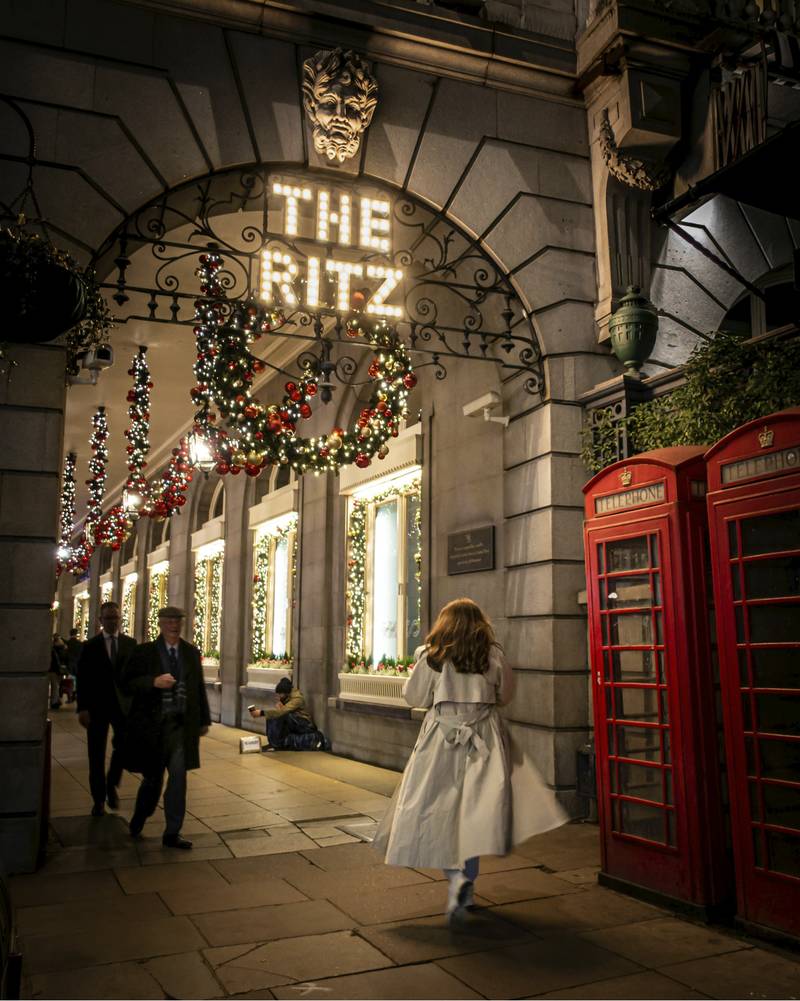
2. St. Regis
St. Regis is all about luxury, and you can see it in everything they do. Just take a look at their Instagram, and you’ll understand. Modern interiors and breathtaking destinations around the globe showcase their commitment to timeless luxury and world-class properties.
From their website to their social media presence to their booking process, everything exudes luxury and embodies the essence of St. Regis. We’re already packing our bags.
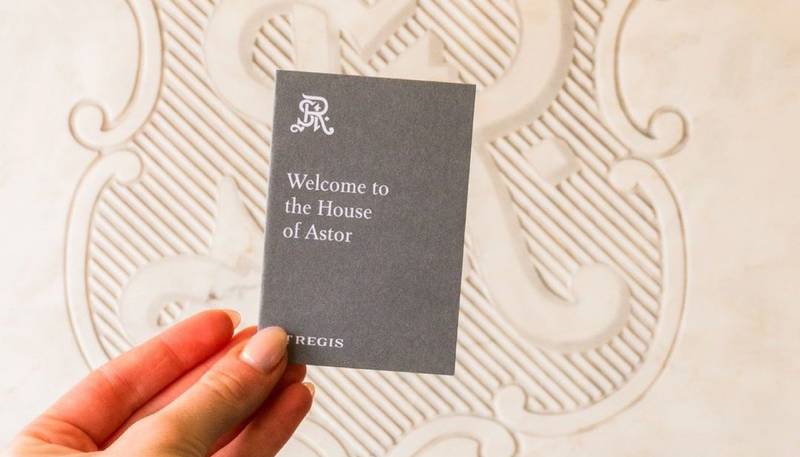
3. The Mandarin Oriental Hotel
The Mandarin Oriental Hotel is famous for its top-notch gourmet food, earning an impressive 25 Michelin stars across 16 locations. So, it makes sense that their dining experience features heavily in their branding.
They cleverly initiated the hashtag #ImAFan, urging guests to share their experiences and engage directly with the hotel. This strategic move not only cultivates a devoted fan community but also amplifies word-of-mouth promotion for the hotel.
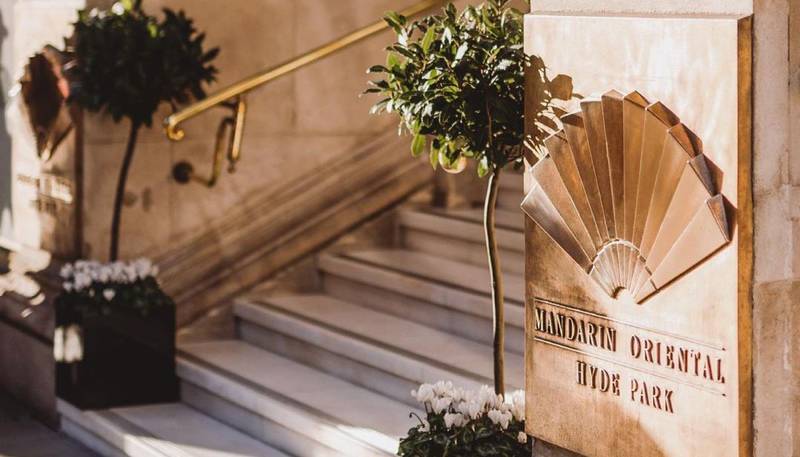
4. One&Only Resorts
One&Only Resorts sets itself apart with a fresh and modern visual identity. Their logo, featuring a sleek serif font and two overlapping Os, is unique in the industry. Their website reflects their dedication to personalised luxury, offering easy navigation and engaging multimedia content.
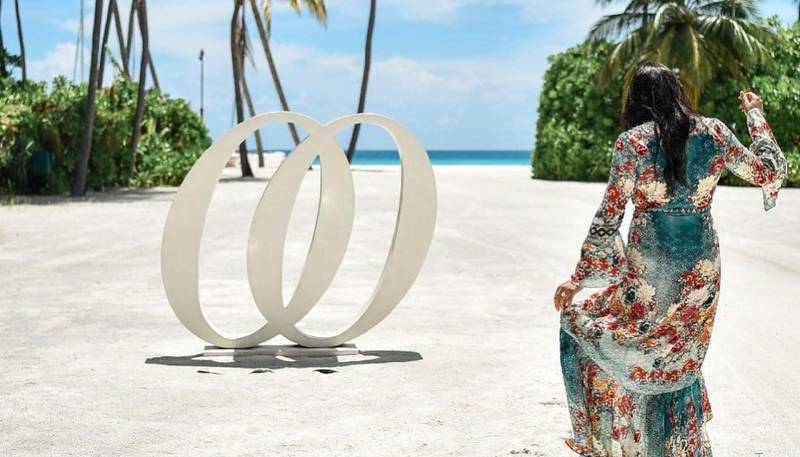
5. Four Seasons Hotel
The Four Seasons Hotels brand epitomises luxury year-round, as showcased by its logo depicting a tree changing with the seasons. Their website features luxurious imagery, sleek design, and seamless booking options. Their social media platforms are filled with stunning visuals, proving why they’re leaders in luxury hospitality.
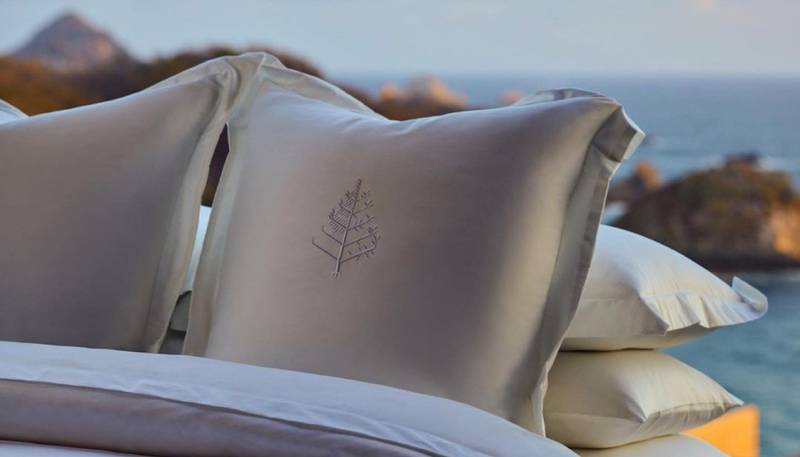
Looking to elevate your hotel brand?
When it comes to luxury branding, there’s no one-size-fits-all solution. But one thing is certain: a powerful brand is key to thriving in the competitive luxury hotel industry.
From defining your brand’s identity to crafting captivating brand stories and executing successful branding plans, we have the skills and imagination to make your hotel shine in a busy marketplace.